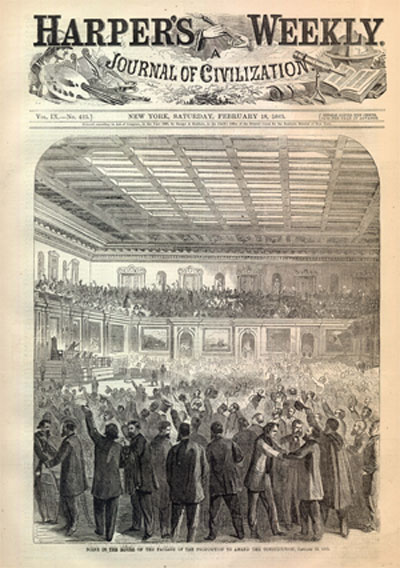Scholars will share perspectives on amendment ratified in 1865
By Sarah Galersgaler@uchicago.edu
News Office
 |
|
University faculty and leading scholars from across the nation will gather Friday, April 17 and Saturday, April 18 at the Law School for a conference on the U.S. Constitution’s 13th Amendment, to debate the meaning of liberty, rights, oppression and race. Adopted in 1865, the 13th Amendment prohibits slavery and involuntary servitude, except as punishment for a crime.
“Slavery, Abolition and Human Rights: Interdisciplinary Perspectives on the Thirteenth Amendment” is a two-day conference that will include more than 30 experts from the disciplines of law, political science, history, public policy, literature and philosophy.
Amy Dru Stanley, Associate Professor in History and the College, and Alexander Tsesis, assistant professor at Loyola University School of Law, organized the conference, which will explore the amendment’s importance to the United States’ history and present.
As the conference summary explains, “The amendment has offered powerful protections for individual rights and equal treatment, against wrongs ranging from peonage and housing discrimination to school segregation and trafficking in persons. A wellspring of American civil rights jurisprudence and legislation, it also has inspired global aspirations for human rights.”
Its legacy is one that academics have rarely studied. The 13th Amendment has been rather overshadowed by the study of the 14th Amendment—that is, the problem of abolishing slavery under the 13th has been overshadowed by the problem of guaranteeing national citizenship and equal protection under the 14th. To be sure, historians and legal scholars have explored the origins and construction of the 13th Amendment, but most often as part of the wider constitutional transformation of the era of the Civil War and Reconstruction,” explained Stanley.
However, the 13th Amendment raises issues that touch the scholarship of all the participating experts, from literature to law. The conference’s interdisciplinary nature is of crucial importance.
Stanley said, “Coercion, autonomy, property, subjectivity and difference are among the core issues raised by the 13th Amendment, issues that speak to concerns at the heart of these diverse disciplines. It is rare to bring together such a host of scholars, allowing for interdisciplinary exchange among the participants and the audience.”
Scholars will debate the meaning of the amendment, including the intent of its framers.
“Exactly what is forbidden by the abolition of slavery and involuntary servitude is far from settled, as a recent confirmation hearing indicates, where abortion and the 13th Amendment came to the fore,” she said.
The implications for the contemporary civil rights movement are considerable, said co-organizer Tsesis.
“Convening a conference on the 13th Amendment is important because it will bring together scholars who will take a new look at both the foundations of abolition and the current reach of the 13th Amendment. At the conference some of the nation’s leading scholars will engage in a robust inquiry into the amendment’s abolitionist roots, the Reconstruction period when it was ratified, the period of neglect, its revivication during the Civil Rights Era and the recent flurry of research on the subject.”
The conference will be held in the Law School Auditorium, 1111 E. 60th St. and is free and open to the public. The conference runs from 8:45 a.m. to 5 p.m. Friday, April 17, and 8:30 a.m. to 4:30 p.m. Saturday, April 18. A reception will follow Saturday’s session.
More information about the conference can be found at http://history.uchicago.edu/conference/13th_Amendment/index.html.
![[Chronicle]](/images/sidebar_header_oct06.gif)